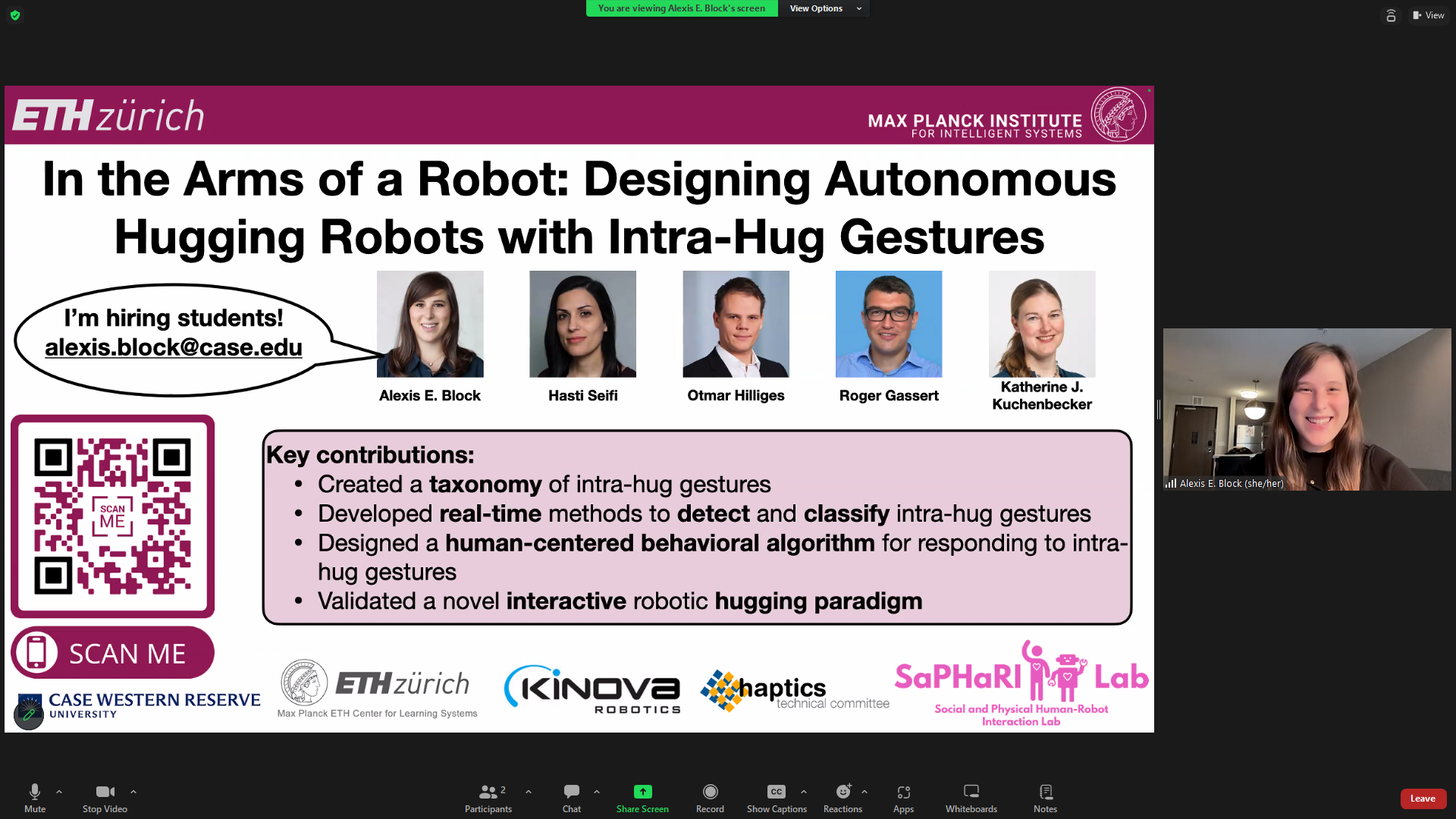Alexis E. Block, the first full-time faculty hire at Case Western Reserve University's Human Fusions Institute, gave two presentations at the recent IEEE/ACM International Conference on Human-Robot Interaction (HRI) in Boulder, Colorado. One was about a recent journal article she published, and the other focused on the course she developed, ECSE 600: Introduction to Human-Robot Interaction. When Block came to CWRU's Department of Electrical, Computer, and Systems Engineering as an assistant professor in Fall 2023, she developed ECSE 600 as an introduction to the field of human-robot interaction. The course covers the robotics design process, different types of human-robot interactions (spatial, non-verbal, physical, and verbal), how to evaluate HRI systems, the user study design processes, how to perform and report statistical analyses on data collected from a user study, safety, and ethical considerations in HRI, and much more! The twelve students in the Fall 2023 course were divided into small groups to design and run a user study with participants and a robot.
Block also brought in guest lecturers from around the world throughout the semester and allowed students to present recent HRI papers to the class. Her paper about developing the course was one of ten accepted for presentation at the workshop.
In addition to discussing lecture content on 11 March 2024, Block recommended five seminal papers from the field to conference attendees that she includes in her curriculum. Additionally, she encouraged workshop participants to incorporate reading recent conference and journal articles into a human-robot interaction course to help students stay up-to-date on the field's state-of-the-art. She also emphasized the importance of adopting a standard robotic platform for all international human-robot interaction courses so the experimental quality of courses in the field will be uniform, regardless of the university's size or funding. Block said that conference attendees seemed particularly interested in the seminal papers she had selected, and many of them said they wanted to incorporate them into their syllabi.
“This was a fantastic workshop, with leading HRI researchers sharing tips and tricks about what worked well and what didn’t, brainstorming creative ideas, and discussing ways to standardize the content of their courses across universities,” said Block.
Her other presentation was an invited talk on 14 March 2024 in which she presented her paper "In the Arms of a Robot: Designing Autonomous Hugging Robots with Intra-Hug Gestures." Published in March 2023 in the ACM Transactions on Human-Robot Interaction journal, the paper focused on design principles and technical considerations for creating autonomous hugging robots capable of understanding and responding comfortably and naturally to intra-hug gestures, including stillness, rubbing, patting, and squeezing. Block used a novel inflatable tactile sensor she created, called the HuggieChest, to collect a large dataset of users performing the different intra-hug gestures and used a random forest classifier to detect and classify unseen gestures. After gathering user preferences for how her robot (HuggieBot) should respond to various gestures, she created an equation to transform the average user ratings she collected into possibilities. She then made a probabilistic behavioral model that determined how the robot should respond to detected user intra-hug gestures.
Block initially thought participants wouldn't like a proactive robot that would initiate intra-hug gestures. However, she was pleased that participants enjoyed when the robot initiated gestures because it made them feel like "(the robot) cared about them." Humans who interacted with the robots also appreciated variety in the gestures the robot performed and liked semi-spontaneous responses because it seemed like the robot was making its own choices rather than just mimicking theirs. After running a validation study with the robot detecting and responding to gestures in real time, she found that the participants developed a more favorable opinion of the robot throughout the study.
In addition to giving her presentations, Block enjoyed hearing from other researchers in her field, including the keynote speaker, Disney Research's James Kennedy. Kennedy spoke about the importance of designing robotic characters (rather than agents), creating consistent personalities, allowing group interaction, and making people feel heard. She also enjoyed a different talk about repair strategies when the robot makes a mistake. In this presentation, the speakers tested various repair strategies. They found that a justification apology was the best option for repairing the loss of trust in the robot after a mistake rather than giving a technical explanation (for example).
Although a snowstorm forced attendees to give presentations virtually the last two days, the in-person days reminded Block of “how wonderful it is to connect with this research community.”
Having attended the annual international conference on three prior occasions and presented twice before, Block became interested in human-robot interaction as an undergraduate student at the University of Pennsylvania. While working on a tactile perception project, she observed a Ph.D. student working on hand-clapping games with a Baxter robot in the lab. Block loved the whole-body interaction between a user and the robot and decided that she wanted to center her master's thesis on hugging robots. Since then, human-robot interaction has been one of the main focuses of her career. “Human-robot interaction for me is an exciting workplace space,” she said. “Because of its interdisciplinary nature. We worry not only about the technical aspects of robotics but also the psychology and human side of things. People are very messy, and that’s where things get interesting with robotics!.”
Block is currently hiring graduate students. Interested students can contact her at alexis.block@case.edu


